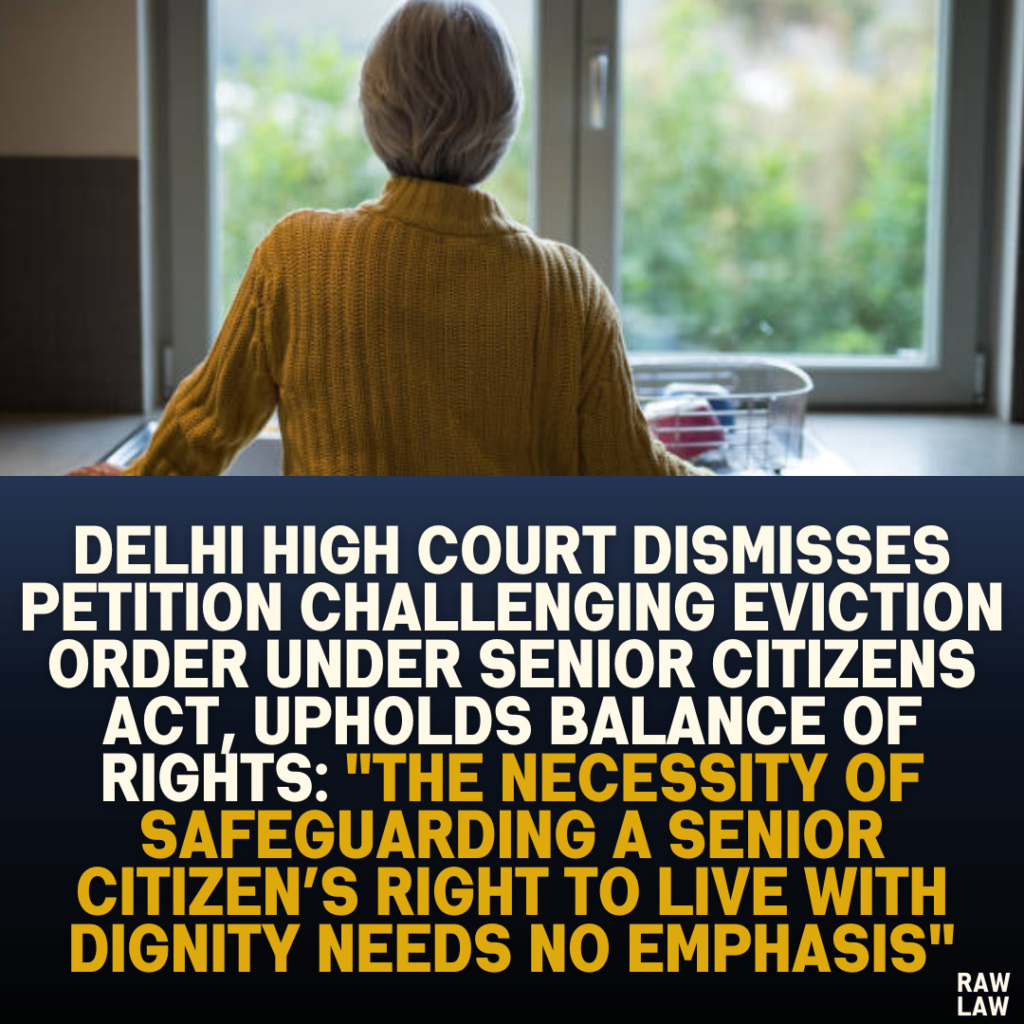Court’s Decision
The Delhi High Court upheld the eviction of the petitioners (the senior citizen’s son, daughter-in-law, and grandchildren) from the property owned by the senior citizen (respondent). It dismissed the petition challenging the orders of the District Magistrate and Divisional Commissioner, ruling that the Senior Citizens Act provides robust protections for senior citizens to ensure they live peacefully in their own homes. The Court rejected the petitioners’ claims under the DV Act, finding no evidence to substantiate their residence rights or allegations of mistreatment.
Facts
The case arose from a dispute over a three-story house owned by an elderly woman. She lived on the first floor, while her son (petitioner), daughter-in-law, and their children resided on the second floor. The senior citizen alleged harassment, ill-treatment, and denial of access to parts of the property. She sought eviction under the Senior Citizens Act to reclaim peaceful possession of her property. The petitioners countered by claiming residence rights under the DV Act, citing financial hardship and contributions to the property’s construction.
Key events included:
- Complaints filed by the senior citizen alleging harassment.
- Eviction orders issued by the District Magistrate and upheld by the Divisional Commissioner.
- Petitioners seeking relief under the DV Act, claiming a right to reside in the “shared household.”
Issues
- Validity of the eviction order: Did the District Magistrate and Divisional Commissioner correctly uphold the eviction order under the Senior Citizens Act?
- Conflict between statutory rights: Can the petitioners’ rights under the DV Act override the senior citizen’s rights under the Senior Citizens Act?
- Natural justice: Did the eviction process violate the principles of fairness and justice?
Petitioner’s Arguments
- The petitioners claimed their eviction violated their rights under Section 17 of the DV Act, which guarantees women the right to reside in a shared household.
- They argued the eviction order ignored their financial vulnerability and contributions to the property’s construction.
- The petitioners relied on the Supreme Court judgment in S. Vanitha v. Deputy Commissioner, Bengaluru, which highlighted the need to reconcile competing rights under the Senior Citizens Act and the DV Act.
Respondent’s Arguments
- The senior citizen asserted her ownership and her right to live peacefully in her property without harassment.
- She argued the petitioners had no legal right or entitlement to the property and had consistently failed in their duties toward her welfare.
- The respondents alleged that the DV Act proceedings initiated by the petitioners were retaliatory and meant to obstruct the eviction process.
Analysis of the Law
The Court examined the relationship between the Senior Citizens Act, which prioritizes the rights of elderly individuals, and the DV Act, which protects women’s rights in shared households. It held:
- Senior Citizens Act: Grants senior citizens the right to reclaim their property if they are harassed or denied peaceful possession.
- DV Act: Protects women’s right to reside in a shared household, but primarily against their spouse or partner.
The Court emphasized that the statutes must be harmonized, but the facts of each case determine the outcome. In this case, the petitioners failed to establish claims under the DV Act.
Precedent Analysis
- Aarshya Gulati v. Government of NCT of Delhi: The Delhi High Court upheld the constitutional validity of Rules 22(3) and 22(4) of the Delhi Senior Citizens Rules, affirming the rights of senior citizens to seek eviction.
- S. Vanitha v. Deputy Commissioner, Bengaluru: The Supreme Court ruled that courts must reconcile the rights under the DV Act and the Senior Citizens Act. However, the Court noted that this case did not involve allegations of domestic violence requiring such reconciliation.
Court’s Reasoning
- Ownership: The senior citizen provided sufficient evidence (sale deed and power of attorney) to prove ownership of the property.
- Petitioners’ Claims: The petitioners failed to substantiate their claims of financial contribution or harassment. No suit for ownership declaration was filed, and no credible evidence was presented.
- Balancing Rights: The Court found no allegations of domestic violence against the senior citizen or her son. Thus, the DV Act could not be used to override the rights of the senior citizen under the Senior Citizens Act.
- Nature of the Dispute: The Court noted that the conflict was primarily a family dispute, not a genuine issue requiring intervention under the DV Act.
Conclusion
The Court dismissed the petition, upholding the eviction order. It ruled that the senior citizen’s right to peaceful possession and dignity outweighed the petitioners’ unsubstantiated claims. The eviction order was allowed to proceed.
Implications
This judgment reinforces the protections afforded to senior citizens under the Senior Citizens Act. It underscores the necessity of ensuring dignity and security for elderly individuals in their own homes, even when weighed against competing claims under other statutes. Courts are reminded to carefully examine the facts of each case to strike a balance between competing rights.
